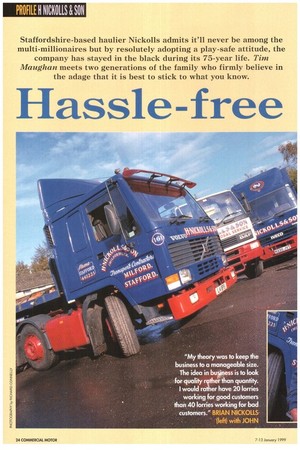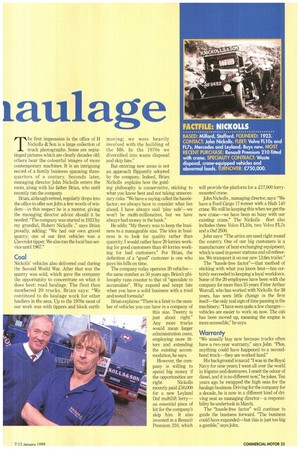Hassle-free
Page 26

Page 27

If you've noticed an error in this article please click here to report it so we can fix it.
taut age
The first impression in the office of H Nickolls & Son is a large collection of truck photographs. Some are sepiatinged pictures which are clearly decades old; others bear the colourful images of more contemporary machines. It is an intriguing record of a family business spanning threequarters of a century. Seconds later, managing director John Nickolls enters the room, along with his father Brian, who until recently ran the company.
Brian, although retired, regularly drops into the office to offer son John a few words of wisdom—in this respect he is a mentor, giving the managing director advice should it be needed. "The company was started in 1923 by my grandad, Hubert Nickolls ," says Brian proudly, adding: "We had our own gravel quarry; one of our first vehicles was a Chevrolet tipper. We also ran the local bus service until 1967."
Coal
Nickolls' vehicles also delivered coal during the Second World War. After that war the quarry was sold, which gave the company the opportunity to concentrate on what it does best: road haulage. The fleet then numbered 20 trucks. Brian says: "We continued to do haulage work for other hauliers in the area. Up to the 1970s most of our work was with tippers and block earth moving; we were heavily involved with the building of the M6. In the 1970s we diversified into waste disposal and skip hire."
But entering new areas is not an approach flippantly adopted by the company. Indeed, Brian Nickolls explains how the guid ing philosophy is conservative, sticking to what you know best and not taking unnecessary risks. "We have a saying called the hasslefactor; we always have to consider what lies ahead. I have always said 'play safe'—we won't be multi-millionaires, but we have always had money in the bank."
He adds: "My theory was to keep the business to a manageable size. The idea in business is to look for quality rather than quantity. I would rather have 20 lorries working for good customers than 40 lorries working for bad customers." For Brian, the definition of a "good" customer is one who pays his bills on time.
The company today operates 20 vehicles— the same number as 50 years ago. Brian's philosophy runs counter to that of "speculate to accumulate". Why expand and tempt fate when you have a solid business with a tried and tested formula?
Brian explains: "There is a limit to the number of vehicles you can have in a company of this size. Twenty is just about right." Any more trucks would mean larger administration costs, employing more fitters and extending the existing accommodation, he says.
However, the company is willing to spend big money if the opportunities are
right. Nickolls recently paid £50,000 for a new Leyland Daf multilift lorry— an essential piece of kit for the company's skip hire. It also invested in a Renault Premium 210, which
will provide the platform for a £17,000 lorrymounted crane.
John Nickolls, managing director, says: "We have a Ford Cargo 17-tonner with a Hiah 140 crane. We will be keeping this when we get the new crane—we have been so busy with our existing crane." The Nickolls fleet also includes three Volvo FL10s, two Volvo FL7s and a Daf 2500.
John says: "The artics are used right round the country. One of our big customers is a manufacturer of heat-exchanging equipment, which is used in power stations and oil refineries. We transport it on our new 13.6m trailer."
The "hassle-free factor"—that method of sticking with what you know best—has certainly succeeded in keeping a loyal workforce. Some of the 20 employees have been with the company for more than 25 years. Fitter Arthur Worrall, who has worked with Nickolls for 38 years, has seen little change in the -firm itself—the only real sign of time passing is the machinery: "I have seen quite a few changes— vehicles are easier to work on now The cab has been moved up, meaning the engine is more accessible," he says.
Warranty
"We usually buy new because trucks often have a two-year warranty," says John. "Plus, anything could have happened to a secondhand truck—they are worked hard."
His background is naval: "I was in the Royal Navy for nine years; I went all over the world in frigates and destroyers. I smelt the odour of diesel, and it is no different now" he jokes. Ten years ago he swapped the high seas for the haulage business. Driving for the company for a decade, he is now in a different kind of driving seat as managing director—a responsibility he undertook in March.
The "hassle-free factor" will continue to guide the business forward. "The business could have expanded—but this is just too big a gamble," says John.
































































































